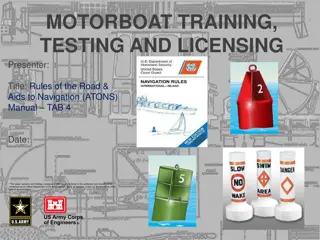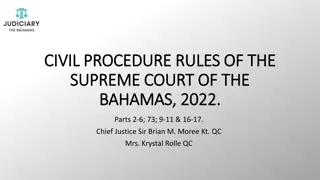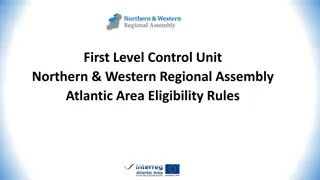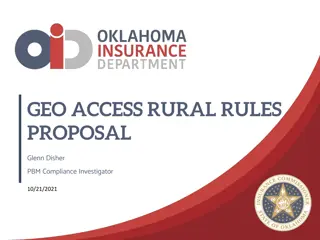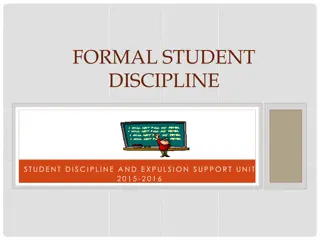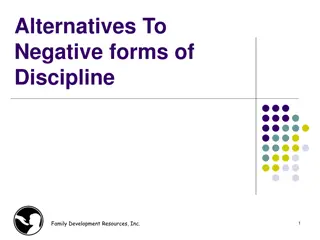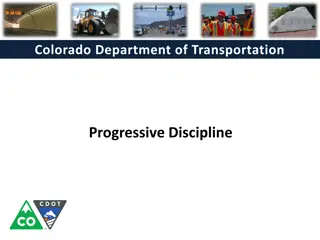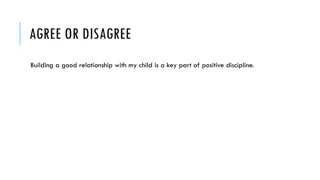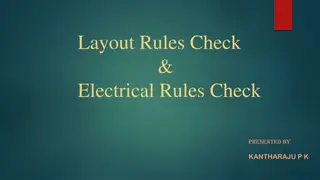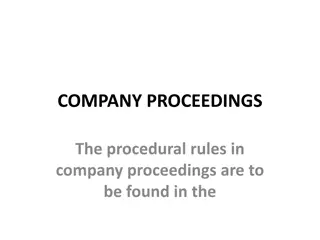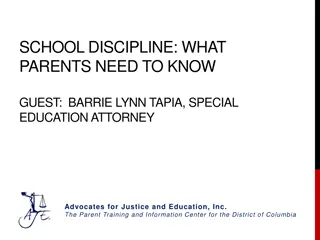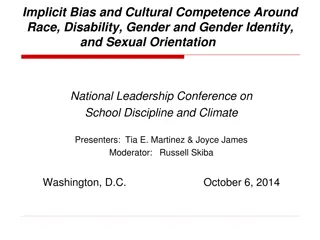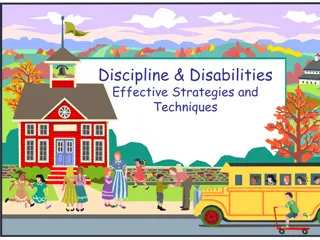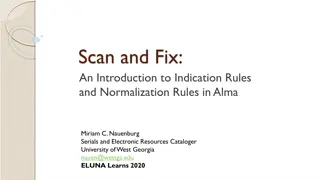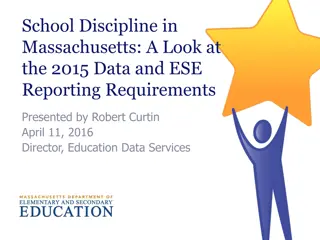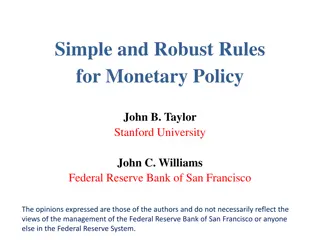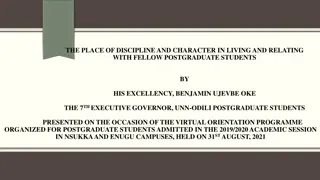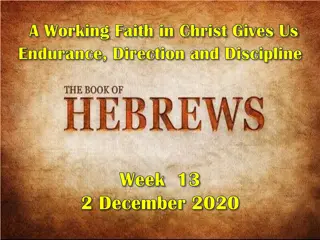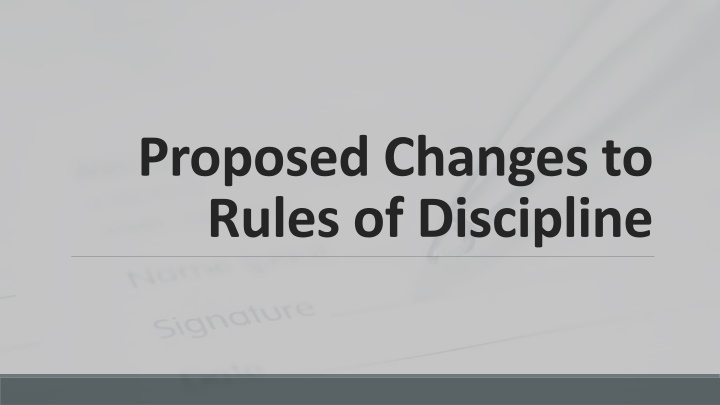
Proposed Changes to Rules of Discipline: Enhancing Accountability and Mediation
The revision of the Rules of Discipline aims to make them more accessible to the church, enhance accountability, expand mediation and alternate dispute resolution, and provide flexibility in crafting censures and remedies. Key figures involved include Barbara Bundick, Greg Goodwiller, and Therese Howell.
Download Presentation

Please find below an Image/Link to download the presentation.
The content on the website is provided AS IS for your information and personal use only. It may not be sold, licensed, or shared on other websites without obtaining consent from the author. If you encounter any issues during the download, it is possible that the publisher has removed the file from their server.
You are allowed to download the files provided on this website for personal or commercial use, subject to the condition that they are used lawfully. All files are the property of their respective owners.
The content on the website is provided AS IS for your information and personal use only. It may not be sold, licensed, or shared on other websites without obtaining consent from the author.
E N D
Presentation Transcript
Proposed Changes to Rules of Discipline
Revision of the Rules of Discipline: Makes them more accessible to the church Preserves and enhances the accountability of councils and individuals to the church Expands the role of mediation and alternate dispute resolution Chicago Overture Provides flexibility in crafting censures and remedies, particularly in light of recent learnings in ethical and social development and experiments by the secular legal system with alternative sentencing.
Barbara Bundick, Honorably Retired, former Stated Clerk, Chicago Presbytery Greg Goodwiller, Executive/Stated Clerk, St. Andrew Presbytery and Executive, Synod of Living Waters Therese Howell, Stated Clerk, Middle Tennessee and North Alabama Presbyteries Task Force members (appointed in Doska Ross, retired Executive/Stated Clerk, Synod of Southern California and Hawaii Donna Wells, Stated Clerk, Presbytery of Greater Atlanta Paige McRight, Moderator, Honorably Retired, former Executive, Central Florida Presbytery 2017) - - - Dan Saperstein, liaison with the Advisory Committee on the Constitution Laurie Griffith and Flor V lez-D az, OGA staff
2017 Initial draft developed Workshop at Mid Council Leaders Gathering Process for Developing Report 2018 Initial draft before the church for review Online survey responses Consultations with stated clerks in synods Workshop at 223rdGeneral Assembly (2018)
2019 Advice from Presbyterian Church (U.S.A.), A Corp, and Advisory Committee on the Constitution Consultation with General Assembly Permanent Judicial Commission, GA Committee on Women s Concerns, GA Racial Equity Advocacy Committee, and the Survivors of Sexual Misconduct Task Force Revision based on feedback before the church for study in preparation for 224thGeneral Assembly (2020) Process for Developing Report 2020-2022 Referred to 225thGeneral Assembly (2022), provisions for online meetings added, revised side-by-side developed
Change name of this section of the Book of Order to Church Discipline Major Changes Proposed Simplify wording and organize sections into process that flows smoothly and clearly Incorporate wording from authoritative interpretations of the Book of Order often cited by judicial commissions in their rulings
Former members can be included among those appointed for review and administrative leave evaluations A quorum of five members can render decisions Changes For Permanent Judicial Commissions Permanent judicial commissions are divided into three classes of membership as nearly equal as possible with vacancy elections to specific classes Eligibility for reelection is reduced from four years to two years Membership is to reflect the membership of the council that elects
Procedures for electronic meetings, testimony, notices, and filings are defined Provision for witnesses to appear electronically if unable to be present replaces depositions General Process Changes Those who are expert witnesses and not witnesses of fact may not be cited and required to appear at trials regardless of their church membership The requirement of a second citation to witnesses has been removed Provision is made for response to an appeal to minimize filing of counter appeals A request to withdraw an appeal is ordinarily automatically granted
Preliminary question regarding stating a claim on which relief can be granted has been expanded Changes to Remedial Process Additional preliminary question is added Declaratory relief is optional not mandatory Witnesses must have first hand knowledge of the matter; hearsay evidence is no longer allowed Decisions may with certain restrictions be completed and published within ten days of the hearing or trial, and at an electronic meeting
A request for reference may be for investigation of allegations as well as for trial Hearsay evidence is allowed still in disciplinary cases Restorative justice is introduced into the alternative resolution process with additional options for acts of voluntary repentance and for mediation Changes to Disciplinary Process Each charge must state the specific provision(s) of Scripture and/or the Constitution which is alleged to have been violated The standard for a finding of guilt spells out the definition of beyond a reasonable doubt when a comparison and consideration of all the evidence compels an abiding conviction that the material facts necessary to prove the charge are true The statute of limitations for filing allegations on any matter is recommended for removal in a separate recommendation
Temporary exclusion may become permanent at the discretion of the council of membership if at the end of the period of temporary exclusion the terms for restoration have not been met. Temporary Exclusion to Permanent; Censure Each censure is imposed with the statement This censure is given not with malice or vindictiveness but in Christian love to offer you correction in error and the possibility of full community restoration or in the case of removal from ordered ministry or membership after error and to restore the unity of the church by removing from it the discord and division the offense(s) have caused.
1. That the General Assembly replace the Rules of Discipline with the revision, Church Discipline. 2. That all time limits for bringing allegations be removed. 3. Three changes to the Form of Government: G-1.0501 and G-3.0105 to provide for electronic meetings of congregations and councils G-1.0503 to provide for receiving a disciplinary decision from the session in a congregational meeting Recommendations 4. That the Office of the General Assembly provide a guide for dealing with cases of sexual misconduct that reflects the need for particular sensitivity to the rights of safety, dignity and privacy of all involved.


